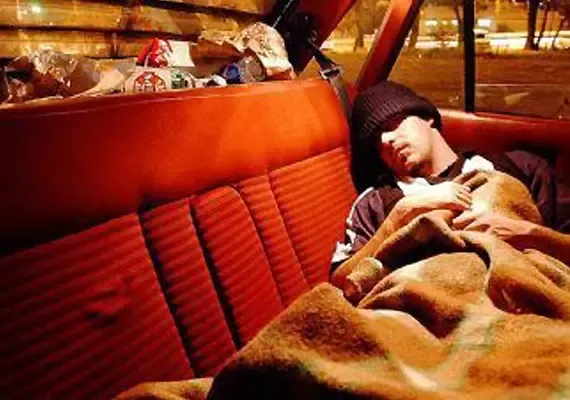Whether driven by economic necessity, a love for adventure, or a simple desire to save on overnight accommodations, sleeping in your car can be a solution for travelers in Washington State. However, it’s essential to be aware of the legal complexities surrounding car sleeping to avoid fines, legal trouble, or being asked to move along in the middle of the night.
Statewide Laws on Car Sleeping
In Washington State, there is no explicit law that prohibits sleeping in your car. However, there are several laws and regulations that can be interpreted to make it difficult or, in certain circumstances, illegal. These include:
- Vagrancy Laws: Some municipalities within Washington still retain local vagrancy laws. These vaguely written laws can often be used to target individuals that appear homeless. It’s important to check the specific city you’ll be in for such ordinances.
- Traffic Laws: If you’re parked on the side of a road or highway, you could be in violation of traffic laws, such as prohibitions against obstructing traffic or parking in no-parking zones. This could result in tickets or even your vehicle being towed.
- Camping Regulations: Many state parks and public areas have rules against camping outside of designated campgrounds. Sleeping in your car could be considered camping in some instances.
City-Specific Ordinances
In addition to statewide laws, many cities in Washington have their own ordinances and regulations concerning sleeping in vehicles. Some areas are more restrictive than others. Here’s a look at a few examples:
- Seattle: Seattle has some local ordinances that can make car sleeping a challenge. The city prohibits “camping” in public parks, which might be interpreted to include vehicles. There are also laws against using a vehicle as a dwelling permanently.
- Spokane: Spokane has ordinances restricting overnight parking in certain areas, particularly in residential neighborhoods.
- Tacoma: Similar to Seattle, Tacoma has restrictions on using vehicles as long-term dwellings. Additionally, there are laws against camping in public parks.
- Smaller Towns and Rural Areas: Smaller communities and rural areas in Washington may have fewer restrictions on car sleeping. You’re still less likely to attract unwanted attention compared to more densely populated urban centers.
Alternatives to Sleeping in Your Car
If you’re looking for places to sleep in your car in Washington State, here are some options to consider:
- Rest Areas: Washington State has numerous rest areas along major highways, which are specifically designed for travelers to rest and sleep. While there are time limits (usually around 8 hours), they offer a safe and legal option.
- Campgrounds: Washington boasts beautiful state parks and national forests with designated campgrounds. Camping fees are usually affordable and provide access to amenities like restrooms and showers.
- Parking Lots (Private & Public): Some businesses, such as Walmart, may allow overnight parking in their lots. Be sure to always get permission from management beforehand. 24-hour grocery stores can also be viable options in certain areas.
Car Sleeping Safety Tips
If you decide that sleeping in your car is the best option for you, follow these safety tips to reduce your risk of problems:
- Choose Your Location Wisely: Look for well-lit, populated areas with regular traffic. Avoid isolated locations or neighborhoods with high crime rates.
- Park Discreetly: Try to blend in with other parked vehicles and avoid drawing attention.
- Lock Your Doors: Always lock your car doors for safety.
- Keep Valuables Out of Sight: Don’t leave valuables visible in your car, as this can attract theft.
- Be a Good Neighbor: Be respectful of the area you park in. Don’t litter or make excessive noise.
- Have a Plan: In case you’re approached by law enforcement or asked to move, be polite and compliant. It’s helpful to have a backup location in mind.
Resources for Support
If you’re facing housing insecurity or homelessness in Washington, there are resources available to assist you:
- 2-1-1 Washington: Dial 2-1-1 or visit https://wa211.org/ for a comprehensive database of resources, including shelters, food assistance programs, and housing support services.
- Department of Social and Health Services (DSHS): DSHS provides various programs to assist low-income individuals and families. Check their website (https://www.dshs.wa.gov/) for information on eligibility criteria and how to apply for assistance.
- The Northwest Justice Project: Offers free legal representation for low-income individuals in civil cases, including matters of housing and homelessness. Visit their website (https://nwjustice.org/) for more information.
Conclusion
Sleeping in your car in Washington State can be a gray area legally. Understanding both statewide regulations and local ordinances is key to avoiding problems. When possible, utilizing designated rest areas, campgrounds, or parking areas with permission is the safest and most hassle-free approach.
It’s crucial to note that even in locations where car sleeping might be tolerated, it should primarily be seen as a temporary solution. If you are struggling to secure stable housing, don’t hesitate to reach out to the support resources mentioned above.
Important Considerations
- Staying Warm: Washington winters can be cold. Ensure you have adequate blankets, sleeping bags, and warm clothing while sleeping in your car.
- Privacy and Ventilation: Consider window coverings for privacy and slightly crack windows for ventilation to prevent condensation.
- Personal Hygiene: Having access to hygiene facilities can be challenging for car sleepers. Some gyms, truck stops, or community centers may offer shower options for a fee.
Disclaimer
This article provides general information on the legality of car sleeping in Washington State. It is not intended as legal advice and should not be taken as a substitute for consulting a qualified attorney. Laws and regulations are subject to change, so it’s always best to verify the most up-to-date information before making decisions about your situation.



